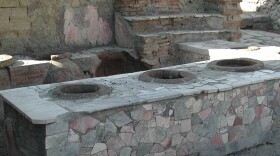One year ago, as COVID-19 cases began to spread in the U.S. many hospitals canceled elective surgeries and many non-emergency appointments with doctors were put on hold.
But heart health is not something that can so easily be rescheduled or put off.
Doctors Lyle and David Joyce are cardiac surgeons at Froedtert Hospital and the Medical College of Wisconsin. They're also father and son, who occasionally perform surgery together. They say COVID-19 has brought significant changes to how they do their work.
“Perhaps the most disappointing thing, on a day-to-day basis is the change that has had with our interaction with patients. I’ve learned over the years that it’s always nice to be able to, not only, come in and see your patient every day but maybe even just touch the patient,” says Lyle Joyce.
Even through the pandemic, the father and son duo still complete joint surgeries.
“The sorts of things that we do are so high risk and you really just need to have every move exactly right in order to get the patient through,” says David Joyce. “So, it’s not uncommon that we’ll tag team an operation and help each other out.”
Both doctors have also worked to find solutions for patients suffering from severe cases of COVID-19. When ventilators were in short supply as case numbers grew, they began using extracorporeal membrane oxygenation (ECMO) machines.
ECMO machines divert a patient’s blood outside their body and through a pump which oxygenates the blood. It is able to keep patients who are suffering from respiratory failure alive for months while their lungs either recover or they wait for lung transplants.
“We found that for people who had this severe ARDS (acute respiratory distress syndrome) form of COVID, with ECMO we could reduce the mortality rate to about 11%, it’s about 54% if the patient was on the ventilator,” says Lyle Joyce.
When it comes to treating heart disease during the pandemic, Lyle says that fear of going to the hospital is delaying patients who’ve had heart attacks from seeking help and that lost time has a large effect on the outcome of the patient.
“Patients probably are waiting a little bit too long when they have a heart attack before coming in.” he says. “If we can’t get blood restored to the heart muscle right away that muscle dies and one of the complications of having part of the heart die is that, that muscle gets mushy, and it will rupture.”
He says if patients can get treatment right away, medical technology has effectively eliminated this issue.
But the pandemic hasn’t been all bad for hearts. Lyle says that more people getting outside and getting exercise is a benefit to heart health.
David says that the pandemic has also shown many of the disparities amongst access to health care and that he, along with others in the field, are working to increase access.
“Those sorts of issues affect heart failure patients and heart disease patients as well, so I think, that’s another area, I think I am hopeful that we as a health care profession can do a better job serving other communities that have not had access in the past,” he says.







